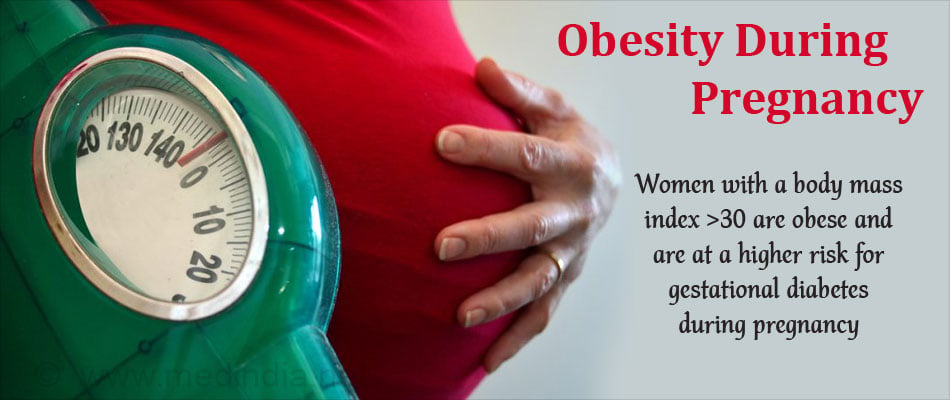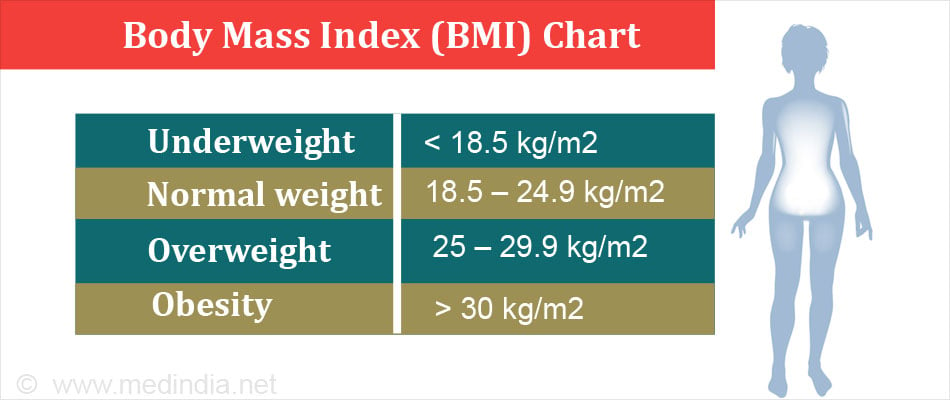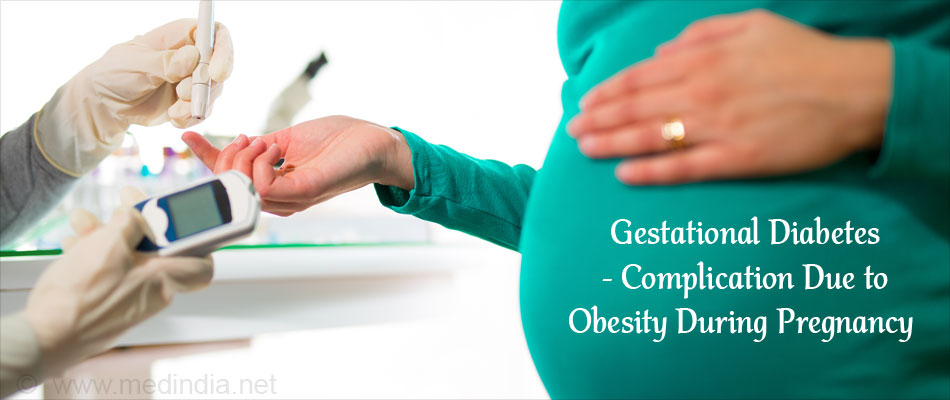- Obesity and Pregnancy FAQs - (http://www.acog.org/patients/faqs/obesity-and-pregnancy)
- Leddy MA, Power ML, Schulkin J. The Impact of Maternal Obesity on Maternal and Fetal Health. Reviews in Obstetrics and Gynecology. 2008;1(4):170-178.
- Sirimi N, Goulos DG. Obesity in pregnancy. Hormones. 2010;9(4):299-306.
- Calculate Your Body Mass Index - (https://www.nhlbi.nih.gov/health/educational/lose_wt/bmi/bmicalc.htm)
- Why your weight matters during pregnancy and after birth - (https://www.rcog.org.uk/globalassets/documents/patients/patient-information-leaflets/pregnancy/pi-why-your-weight-matters-during-pregnancy-and-after-birth.pdf)
- Management of Women with Obesity in Pregnancy - (https://www.rcog.org.uk/en/guidelines-research-services/guidelines/management-of-women-with-obesity-in-pregnancy/)
Obesity during Pregnancy
Many of us tend to encounter a point in our lives where we begin to put on weight. While a few of us begin to take measures to control it, there are many who brush it aside as a passing phase. And sometimes, ignoring the changes results in a huge weight gain in a few months or years resulting in an extremely overweight individual. According to a review on maternal obesity by Dr. Meaghan Leddy at al, “We are eating more and moving less.”
Did you know that all overweight individuals are not obese? Being normal weight, overweight or obese depends on a parameter called the body mass index (BMI). An individual is termed as obese if the BMI value is 30 or higher.

There are numerous risks to health based on the BMI value. Pregnant women who are obese are faced with the health risks of obesity that can extend to their unborn child. The World Health Organization estimates that obesity during pregnancy has a prevalence of 1.8% to 25.3%. Women who become obese during or just after their pregnancy have a higher risk of becoming obese in their later life. Pregnant women also face health complications, such as gestational diabetes and preeclampsia, or need a cesarean delivery, which could be associated with complications.
BMI Chart
The body mass index is calculated from the weight and the height of an individual with a simple formula BMI = kg/m2 [weight (kg)/ height2 (m2)]
To understand the significance of the BMI values, the following are the ranges of BMI values to be taken into consideration.
- Underweight BMI < 18.5 kg/m2
- Normal weight BMI = 18.5 – 24.9 kg/m2
- Overweight BMI = 25 – 29.9 kg/m2
- Obesity BMI > 30 kg/m2
The least amount of health risk in an obese person is when the BMI values lie between 30 and 34.9. The greatest health risk is when the BMI value is 40 or higher.

One should be aware that even though BMI is the most frequently used tool to measure obesity, it is not the most accurate measure. This is because BMI takes only weight and height into consideration. The weight may be increased due to muscle mass rather than just fat. For example, the BMI values of professional sports people are high but they do not signify obesity since the increase in BMI is due to increased muscle mass rather than increased levels of fat. Similarly, reduced muscle mass in elderly people or children who have not completed their growth can indicate low BMI although the reduced values are due to decreased muscle rather than fat. Also, the BMI in women should be recorded before pregnancy, because the changes during pregnancy may cause inaccurate BMI results.
Are the chances of becoming pregnant affected if you are overweight?
Being overweight certainly reduces the ease with which you can become naturally pregnant. Yet, it is not impossible for overweight individuals to become pregnant naturally.
What are the Health Problems Faced by the Mother due to Obesity during Pregnancy?
Pregnant women with a BMI > 30 are exposed to health issues such as gestational diabetes and preeclampsia.
Gestational Diabetes:
Pregnant obese women have a 3 times increased chance of suffering from gestational diabetes compared with pregnant women who have normal BMI. Gestational diabetes is a condition in which diabetes appears for the first time during pregnancy. It often subsides following delivery of the baby, but increases the future risk of suffering from diabetes.

Blood Clots (e.g. thromboembolism):
Pregnant women have higher chances of developing blood clots in blood vessels compared with non-pregnant women. If you are obese, the chances of having blood clots (especially in the legs) are further increased.
Preeclampsia:
Preeclampsia is a condition associated with high blood pressure and high protein levels in the urine. It may cause swelling in the ankles, feet and hands, pain in the ribs, vision issues and headache. Obese pregnant women (BMI >35 kg/ m2) have a higher chance (the risk is increased 2 times) of preeclampsia.
Vitamin D Deficiency:
Pregnant women who are obese have an elevated risk of vitamin D deficiency. It is recommended that obese pregnant women supplement their diet with 10 mg of vitamin D per day.
Complications During Delivery:
The chances of bleeding following delivery may be higher following delivery in obese women. Cesarean sections may be required more commonly in obese women. These could be associated with a higher risk of complications including infections and complications due to anesthesia.
How Could Obesity Affect My Baby?
Obesity causes various complications during pregnancy which can affect the baby. Some of them are mentioned below:
Premature Delivery:
Obesity increases the chances of delivering a baby preterm. Preterm babies experience health risks that may last for a short or long duration Since they are not completely developed as compared with their counterparts who are born following the full 39 weeks of pregnancy.

Miscarriage or Stillbirth or Neonatal Mortality:
Pregnant women who have high BMI values have a higher chance of miscarriage or delivering babies who are stillborn. These babies are also at a higher risk of dying soon after delivery.
Macrosomia:
Macrosomia is a condition where the baby is larger than normal. The chance of babies with a high birth weight of more than 4 kg in obese pregnant women is 14% and is twice the rate observed in normal BMI pregnant women. Cesarean sections are recommended to deliver the babies without any harm to their bodies as they may find it difficult to pass through the birth canal and may get stuck. Babies that are born with extra fat may have higher chances of becoming obese in their later life.
Birth Defects:
Babies born to pregnant women who are obese have a greater chance of suffering from birth defects in their body, such as defects in the neural tube (spina bifida) and heart defects.

Though the risk of complications is high, obese women can still have normal pregnancies, especially if the pregnancy is carefully monitored by the gynecologist and the dietitian.
How Can Obesity be Treated Prior to Pregnancy?
It is highly recommended that women who are obese or overweight should attempt to lose weight before trying to get pregnant to reduce the complications for the mother as well as the baby. It has been observed that normal BMI increases the chance of conceiving in a natural manner. Some measures that can be used for weight reduction are the following:
- Diet and exercise are definite weight management methods to reduce excess body weight before pregnancy.
- If weight management methods do not work, bariatric surgery may be an option for weight loss. Following bariatric surgery, the woman will need to wait for 1 to 2 years before attempting to get pregnant. The 1 to 2 year period is the time frame when the woman will lose the maximum weight following the surgery.
How Can My Weight Be Managed During Pregnancy?
A healthy pregnancy requires a healthy diet and appropriate physical exercise.
Exercise: It is recommended that a pregnant women should exercise regularly after getting clearance for the same from the treating gynecologist. However, strenuous exercise is not recommended. Swimming, walking are some of the recommended exercises. If you have never exercised before, you will need to talk to your healthcare professional to get the required suggestions on what exercises to perform. Ideally, one should begin with a 15-minute exercise regimen (3 times a week) that can then be increased to 30 minutes (daily). If the exercise is making you breathless, you are doing strenuous exercise and you need to tone it down.
Following are the examples of the types of exercises that can be performed:
Moderate activity: Biking, gardening, walking for 60 minutes
Strenuous activity: Strenuous yard work, jogging, swimming laps for 30 minutes for nearly all the days of the week.
Diet: Make sure you follow a healthy eating pattern during and after your pregnancy. Some of the recommendations for a healthy diet are based on those of the Royal College of Obstetricians and Gynecologists (RCOG).
- Breakfast should always be eaten.
- Watch the size of your food intake. Eat only for yourself and not for two!
- Make sure there is an intake of foods containing starch, such as rice, potatoes, and pasta.
- Eat foods rich in fiber, such as fruits, oats, lentils, and vegetables.
- Avoid fats and high-calorie diets, such as artificial juices, confectionaries, and fried food.
- Consume a minimum of 5 portions of fruits and vegetables.
Note: What does one portion of a fruit or vegetable mean? One portion of a fruit is equivalent to an apple, a pear, or a handful of grapes. One portion of a vegetable is half a foot long carrot or a cucumber.
Regular visits to the doctor or dietitian will help to monitor the progress of the pregnancy as well as weight gain. Monitoring your weight will help you during your pregnancy as well as for future pregnancies and reduces the risk for diabetes.
There are specific recommendations for the labor procedures to be followed for obese pregnant women. Most of the obese pregnant women are likely to have a C-section, induced labor, or a forceps delivery.
Health Tips
Regular exercise based on the treating doctor’s guidance and a healthy diet are recommended for obese women who become pregnant.











